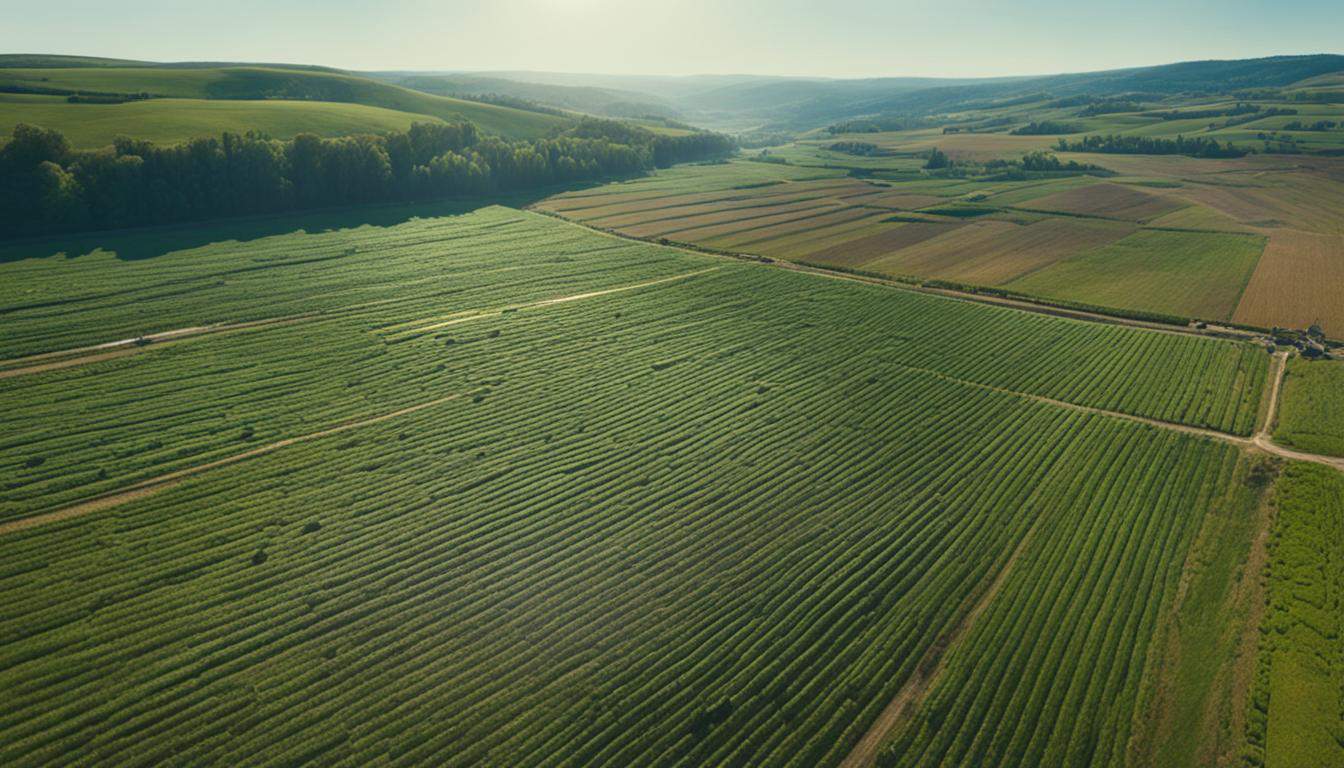Table of Contents
Ever thought about the jobs that built Ancient Israel’s society and economy? Farmers cared for the land, while herders looked after their animals. These roles were key in supporting the community. Join us to learn about the many jobs people had in this interesting time. Let’s discover and explore together!
Farmer
Farming was key in Ancient Israel, supporting the society as a whole. The country’s rich land, plenty of water, and the right weather made farming thrive. This is seen in religious texts like Genesis 25:23 and Deuteronomy 8:8, linking farming to the daily life and faith of the people.
Ancient Israel’s farmers put a lot of care into their work. They planted wheat, barley, grapes, olives, figs, and pomegranates. They also kept sheep, goats, and cows. These animals gave them food, wool, and leather.
“The land of Israel is a land flowing with milk and honey.”
To grow the best crops, these farmers used smart watering and planting methods. They knew changing planting spots could keep soil healthy. Also, they worked the land during different times of the year.
They used terraces, made ponds, and built water systems. These helped their plants grow well.
The food and services from Ancient Israel’s farms were very important. They not only fed people but also made money. Farmers sold extra food and goods to other places. This helped make their society wealthier.
Shepherd
In Ancient Israel, herding sheep and goats was crucial. It played a big role in society and the economy. Being a shepherd was an honored job. They took care of their flocks, making sure they were safe and healthy.
Shepherds knew a lot about taking care of sheep and goats. They found good places for them to eat and drink. Shepherds kept them safe from danger and helped them find water. They were skilled at choosing the best places for the animals to graze.
Being a shepherd was more than just looking after animals. It was also seen as a spiritual job in Ancient Israel. People often used the role of a shepherd to talk about leaders and rulers. King David, a famous king, was a shepherd before he became king. This shows us how important shepherds were in society.
For the LORD sees not as man sees: man looks on the outward appearance, but the LORD looks on the heart.
Being a shepherd is also important in religious stories. The Bible talks about God being a shepherd. This shows God as someone who cares for and guides people. One famous part of the Bible, Psalm 23, starts with “The LORD is my shepherd; I shall not want.”
To know more about the job of shepherds in Ancient Israel, let’s look at what they did:
- Shepherds led their flocks to good grazing areas.
- They protected them from dangerous animals like wolves and lions, sometimes risking their own lives.
- Shepherds made sure the flock had plenty of fresh water to drink.
- They built strong relationships with their animals, using names and sounds to keep them together.
- Shepherds oversaw the breeding of their animals to keep the flock strong and healthy.
- If a sheep or goat was lost or hurt, shepherds would find and care for them.
Being a shepherd was a very important job. Its cultural and historical importance can still be seen today. It shows the close link between the people of Ancient Israel and their land.
| Shepherding in Ancient Israel | Key Aspects |
|---|---|
| Rise of King David | King David’s journey from being a shepherd to becoming one of the most renowned kings exemplified the significance of shepherding in Ancient Israel. |
| Spiritual Symbolism | The figure of a shepherd was often used metaphorically to describe leaders and rulers. In religious texts, God is often depicted as a shepherd, symbolizing care, guidance, and protection. |
| Vital Role in Society | Shepherds were responsible for the well-being of their flocks, providing grazing management, protection, water source management, flock cohesion, breeding assistance, and rescue operations. |
Craftsman
In Ancient Israel, skilled craftsmen were very important. They made beautiful and useful items from different materials. These experts worked with metal, wood, and cloth, showing their great skills. Their work helped both the culture and economy of Ancient Israel grow.
Metalworking was a top craft. Craftsmen used methods like casting and engraving to make amazing metal objects. They created not just tools but also stylish items and weapons. Their talent in shaping metal into functional and beautiful pieces was highly admired.
Woodworking was important too. Skilled woodworkers made everything from furniture to small kitchen tools. They used techniques like carving to make detailed and strong wood items. These pieces not only served practical needs but looked beautiful too.
| Materials | Products |
|---|---|
| Wood | Furniture, architectural elements, utensils |
| Metal | Decorative items, weapons, tools |
| Textiles | Garments, tapestries, rugs |
Weaving was also key in Ancient Israel. Weavers turned raw fibers into lovely fabrics for clothes and more. They used special techniques to create strong and pretty textiles. These fabrics were a big part of the people’s daily wear, showing their culture and status.
Textiles weren’t just for clothes. They were also central to religious rituals. Tapestries and rugs made spaces more beautiful and special for ceremonies.
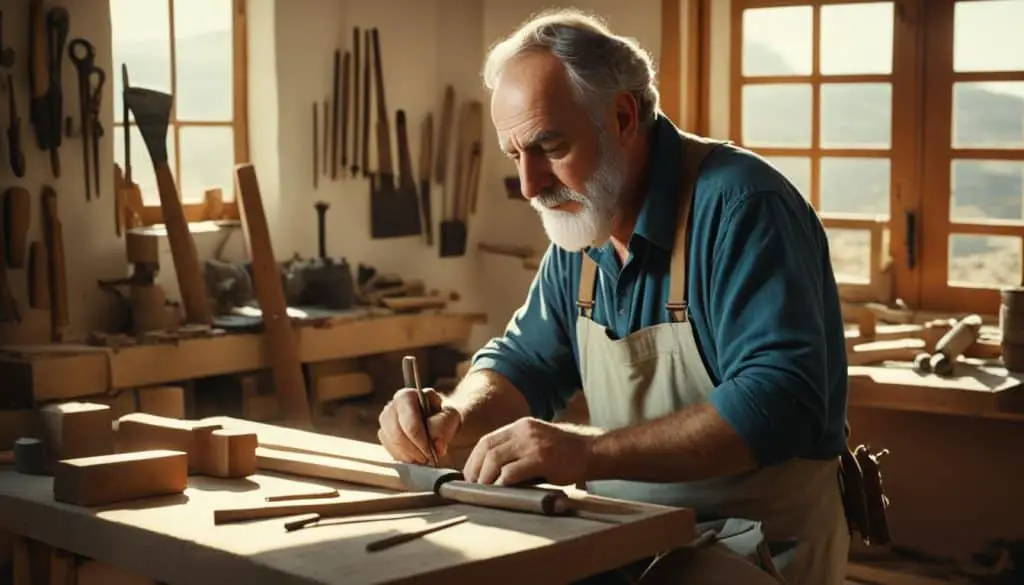
These craftsmen greatly advanced Ancient Israel’s culture. They provided both practical and beautiful items. Their hard work and skills are still remembered, influencing art and crafts to this day.
Baker
In Ancient Israel, bakers were very important. Bread was the main food, feeding everyone. It was seen as a sign of plenty and life. Bakers were respected for their skill.
Making bread was a detailed art. Bakers had to do every step perfectly. They kneaded the dough and let it rise. Then, they baked it in ovens or clay hearths. The smell of bread baking was everywhere, bringing joy and comfort.
Bread meant more than just eating. In religious events, it was a key part. It was an offering and had deep meaning in stories from the Bible.
“Pharaoh’s chief baker, however, was impaled, just as Joseph had said it would happen.” (Genesis 40:16)
Bakers were not just cooks. They were essential for life and spirituality in Ancient Israel. They kept food coming and united people through this daily need.
Potter
In Ancient Israel, pottery was crucial to daily life. Potters were skilled at making various containers for food and drink. These vessels were key in food storage, meal prep, and other tasks.
Pottery from that time gives archaeologists a peek into daily life back then. These pots often had fancy designs and symbols. This showed how artistic and skilled the potters were. Each piece was a work of art and practical use.
Pottery was a must-have for storing food such as grain, oil, and wine. These items needed careful storage, which the pottery provided. In Ancient Israel’s farming world, preserving food was vital because resources changed with the seasons.
| Types of Pottery | Function |
|---|---|
| Cooking Pots | Used for preparing meals by boiling or stewing ingredients. |
| Storage Jars | Provided airtight storage for grains, oils, and liquids. |
| Bowls and Dishes | Used for serving and eating meals. |
| Oil Lamps | Provided light in households. |
Making pottery was a mix of skill, knowledge, and care. It meant molding clay and firing it to make it strong. Potters knew all about clay. They could turn it into any shape they wanted.
Pottery-making was both a job and a way communities stayed strong. Clay was easy to find, which brought people together. It helped economies and trade thrive.
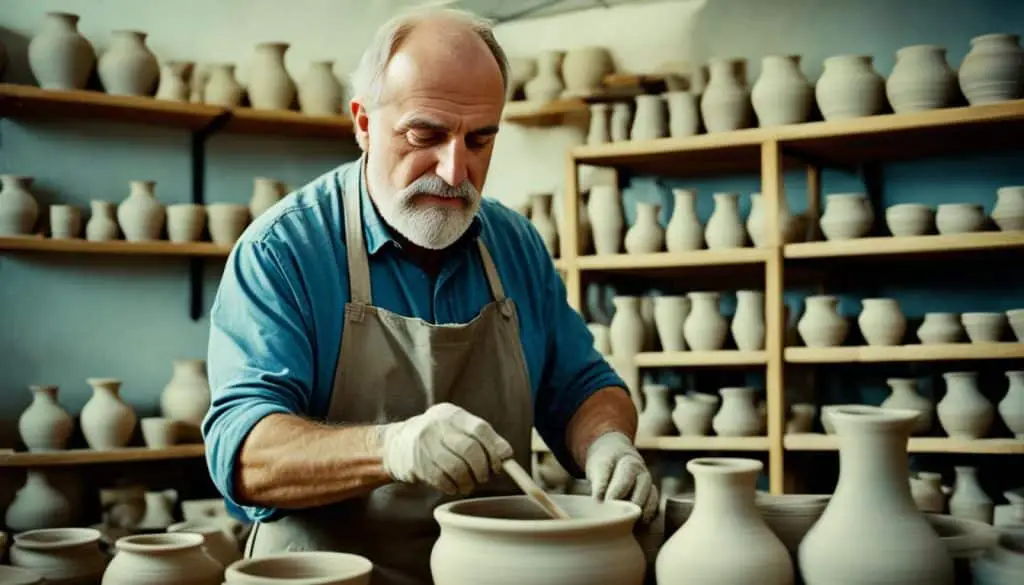
In the Bible, Jeremiah uses a potter to talk about God and people. It shows God’s power to guide his people. This shows how important pottery was in cultural and religious life.
Pottery wasn’t just useful; it was an art form too. It tells us a lot about ancient Israel. we learn about their daily lives and what they valued by looking at their pottery.
Weaver
In Ancient Israel, weaving cloth was very important. It was vital for making clothes and other textiles. Weavers made fabrics that were both useful and pretty. They were a key part of the community, creating essential supplies with their detailed work.
Weaving involved a loom and intertwining threads. This created a fabric. Weavers used materials like wool and linen to make many types of textiles. Clothes showed not only what people needed but also their place in society and culture.
Weavers made cloth beautiful with designs, colors, and patterns. This made it culturally and visually important. Weaving was a crucial craft passed from one generation to the next in Ancient Israel.
The weaving craft in Ancient Israel combined creativity, skill, and usefulness. It let people express their culture while making needed items for the community.
The importance of weaving is mentioned in the book of Exodus. Exodus 35:35 says, “He has filled them with skill to do all kinds of work as engravers, designers, weavers and embroiderers in blue, purple and scarlet yarn and fine linen, and with all kinds of skills to make artistic designs.” This shows how important weaving was for cultural and religious purposes.
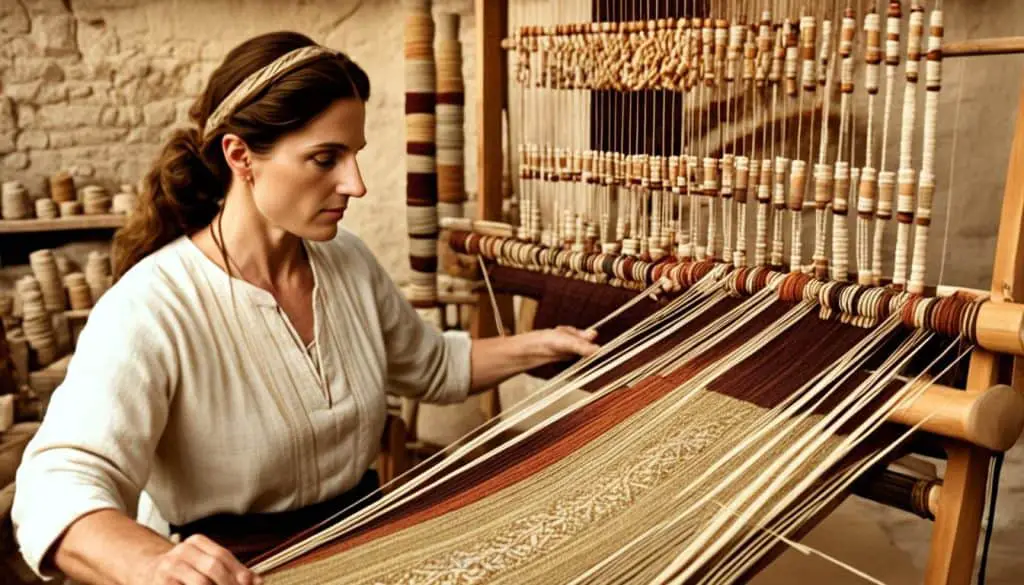
| Weaver in Ancient Israel | Description |
|---|---|
| Main Skill | Weaving cloth for clothing and textiles |
| Materials Used | Wool, linen, vegetable fibers |
| Importance | Vital to clothing production and cultural identity |
| Significance | Contributed to the economy and shaped society |
Weaving Techniques
There were different techniques weavers in Ancient Israel used. They made intricate patterns and structures in textiles. Some of their methods included:
- Plain Weave: Threads were woven over and under each other. This made a strong fabric.
- Twill Weave: Threads were woven in a diagonal way. This made a chevron pattern on the cloth.
- Damask Weave: Weavers created reversible patterns. They alternated shiny and matte surfaces with warp and weft threads.
Ancient Israelite weavers made a variety of textiles using these methods. From everyday wear to ceremonial garments, their craftsmanship was highly valued.
Merchant/Trader
In Ancient Israel, farming and shepherding were key jobs. But, trade and commerce were also important. Merchants and traders used trade routes to boost the economy and share cultures.
These entrepreneurs traded goods and services, aiding the growth of commerce in the area. They dealt with items like spices, textiles, metals, and farm products.
They saw the potential in trading and traveled along known routes. This connected Ancient Israel with other places, like Egypt and Mesopotamia, for trade and cultural mix.
Merchants and traders brought wealth and new ideas to Ancient Israel. They greatly impacted the economy and society.
“She is like the merchant ships, bringing her food from afar.” – Proverbs 31:14
The verse from Proverbs shows the value in bringing goods from far places. It highlights merchants’ important role.
Merchants and traders not only provided necessary items but also brought new ideas. They helped the society to grow and prosper.
Trade Routes in Ancient Israel
Ancient Israel was at the heart of trade routes connecting several civilizations. These included the Incense Route and the King’s Highway.
- The Incense Route: Carrying precious things like frankincense and myrrh, it linked the Arabian Peninsula to the Mediterranean through Israel.
- The King’s Highway: A trade path from Egypt to Mesopotamia, it also passed through Ancient Israel.
Being where it was, Ancient Israel was a hub for trade. It was perfect for merchants to build connections and do profitable business.
Examples of Traded Goods in Ancient Israel
| Commodities | Origin | Trade Routes |
|---|---|---|
| Spices (such as frankincense and myrrh) | Arabian Peninsula | Incense Route |
| Textiles | Egypt, Mesopotamia | Various trade routes |
| Precious metals (such as gold, silver) | Various regions | King’s Highway, Mediterranean trade |
| Agricultural products | Ancient Israel | Local and regional trade |
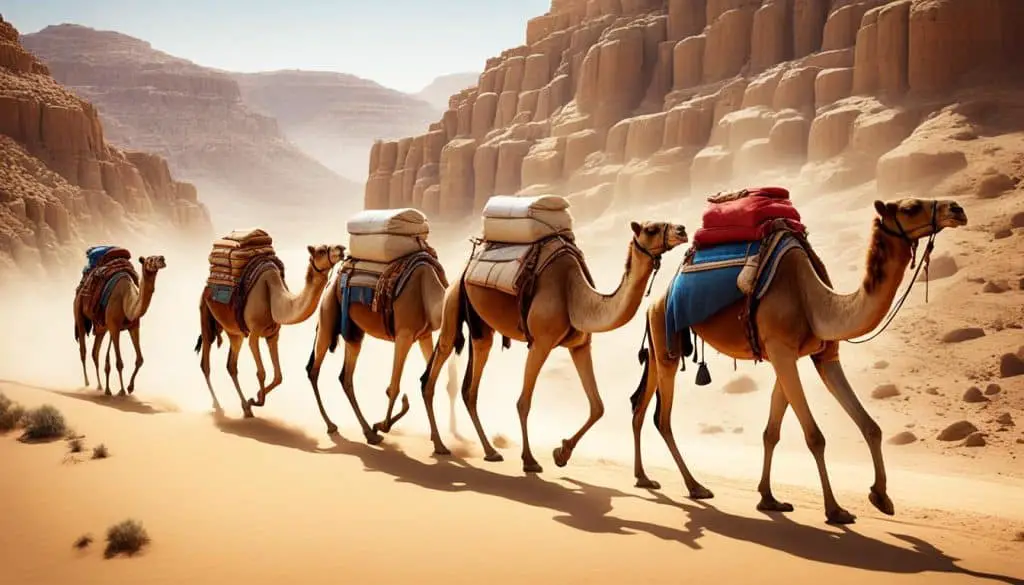
Builder/Mason
Ancient Israel had a busy construction sector that relied on skilled builders and masons. Their craftsmanship and construction knowledge were crucial in shaping the buildings of the time.
These skilled workers built houses, temples, and important structures. They focused on quality to make sure their work lasted a long time.
In building Solomon’s temple, both Israelite builders and experts from Tyre worked together. This teamwork led to a magnificent temple.
“And Solomon had seventy thousand carriers and eighty thousand stonecutters in the hills, as well as thirty-three hundred supervisors who oversaw the work. At the king’s command, they removed from the quarries large blocks of high-quality stone to provide a foundation of dressed stone for the temple.”
The construction in Ancient Israel was massive, needing many builders and masons. They were skilled in all aspects, from quarrying to placing stones accurately.
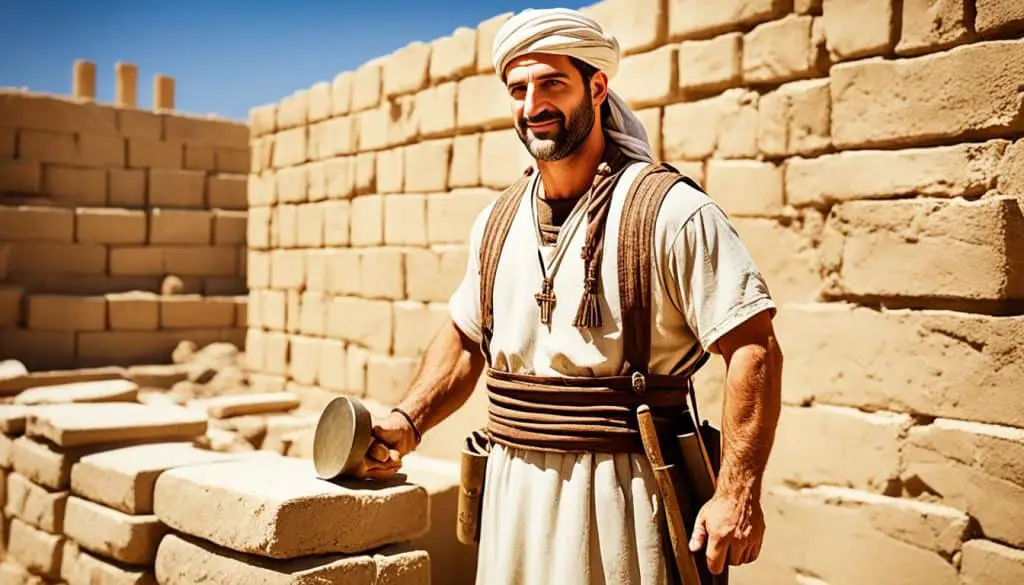
Builders and masons were respected in Ancient Israel. Their work provided for their families and helped community growth.
| Key Responsibilities | Skills Required |
|---|---|
| Constructing houses, temples, and fortifications | Knowledge of architectural design and engineering principles |
| Quarrying and shaping stones | Expertise in stonemasonry |
| Collaborating with other construction professionals | Ability to work in a team and communicate effectively |
| Ensuring structural integrity and durability | Attention to detail and craftsmanship |
The legacy of these builders and masons still stands in Israel through remarkable structures. Their dedication and skill shaped Ancient Israeli architecture.
Soldier
In ancient Israel, wars were common, leading to the creation of a standing army. This was vital for protecting the nation. Soldiers were key in keeping the peace and defending against outside dangers.
Soldiers had many tasks, from being well-trained for battle to protecting the people. They learned fighting skills like using bows and swords. They also planned strategies for times of war.
Israel fought many wars with nearby enemies like the Philistines and Assyrians. Soldiers were the heroes who faced these enemies, often risking their lives for their country’s safety.
“No harm can come to you. All Israel knows you are a hero, that you have the heart of a soldier.”
The soldier role was crucial in developing Israel’s military. Armies were organized into groups, guided by skilled leaders. These leaders maintained order and unity.
Soldiers’ courage and heroism were well-regarded. Their loyalty and bravery protected Israel, ensuring its security during conflicts.
| Key Attributes | Responsibilities |
|---|---|
| Physical fitness and endurance | Engaging in combat and warfare |
| Discipline and obedience | Following orders and military commands |
| Training and skill development | Mastering various forms of warfare |
| Loyalty and patriotism | Safeguarding the interests of Ancient Israel |
| Strategic thinking and planning | Devising military strategies and tactics |
Over time, soldiers have played key roles in nation-building and protecting the people. In Ancient Israel, they were the protectors of peace and justice. They fought against foes to keep their people safe.
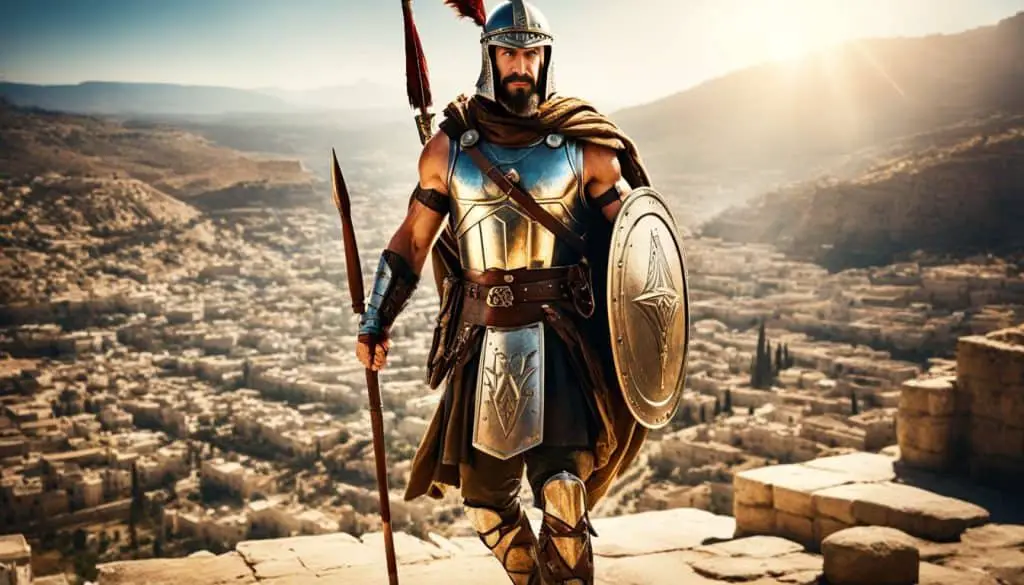
Priest/Levites
In Ancient Israel, religious duties were very important. A group of priests and Levites carried them out. They were key to the spiritual health of the community. They made sure everyone followed the right religious practices.
Priests were like go-betweens for the people and God. They did special rituals, like sacrifices, and led ceremonies. Levites helped with the practical side of worship. They kept the sacred places in order and aided the priests.
These religious experts were essential to Ancient Israel. They kept its spiritual traditions and guided its people. They were known for their wisdom. Anyone wanting spiritual advice could turn to them.
The priest and Levite class showed how vital religion was in Ancient Israel. They linked people with their faith. Through their hard work, they built a strong community. This helped the Israelites keep their faith alive for many years.

